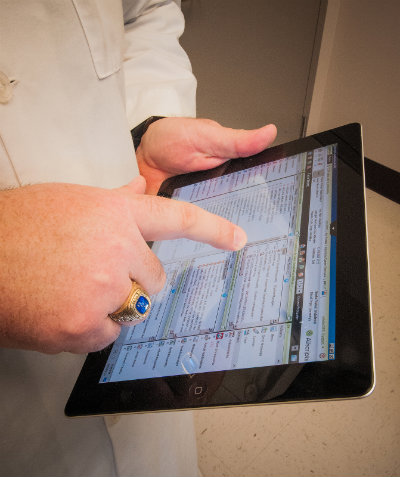

There are numerous ways automation can be applied to the healthcare industry. One of the most common now in use doesn’t necessarily use new technology, but it does apply it in new ways. In this case, hospitals are using wearable technology to improve patient outcomes while also reducing expenses. Medical organizations have taken to using wearable tech like blood pressure cuffs, glucose monitors, and wireless scales to better monitor patients. These devices can be hooked up to a wireless internet network and alert doctors and nurses if a problem is about to occur. Problems that are caught early on can be treated quickly, which usually translates to fewer expenses down the road. The results have been impressive so far. In California, a Medicare company that uses wireless glucose monitors has reduced amputation rates for diabetic patients while spending below the average national rate per patient by 18%.
Perhaps one of the most promising uses of automation in health care comes from the recent advances in artificial intelligence. Using artificial intelligence and big data, doctors can get access to a vast amount of medical history by which they can make important decisions for patient treatment. The medical databases are basically an archive of collected information and knowledge from doctors all over the country. One example of these databases is Modernizing Medicine, which also includes insights from medical professionals that can help other doctors determine treatments based off of similar cases. Artificial intelligence can take symptoms that are inputted into these databases and detect patterns that would be hard for humans to recognize. AI also has the ability to detect early on those patients that are at risk for certain diseases. One way it does this is by taking into account genetic information that is now more easily stored by hospitals and other organizations thanks to advances in flash storage technology. Hospitals and businesses have gravitated toward the technology due to its easy scalability and faster processing powers, which can be seen when comparing flash storage vs. hard drive capabilities.
Artificial intelligence in healthcare is proving to be a game changer in other ways. An Indiana University study showed that doctors who use AI to help them make treatment decisions increased patient outcomes by 50% while health care costs decreased by 50%. But those are just savings on the treatment front. Artificial intelligence can also be used to save on labor costs. Mathematical formulas used by Assay Healthcare Solutions are instrumental in how nurses are scheduled. Taking into account data from the past three years, the formulas are able to determine when demand will increase for personnel. By correctly predicting the number of staff needed at a hospital and any given time, artificial intelligence ensures that there will be no understaffing or overstaffing problems, effectively saving on labor.
Tweet This: A study shows doctors helped in #health decisions by AI improved patient outcomes by 50%
Automation is also proving to be vital in helping hospitals and medical organizations in dealing with case management processes. Organizations get a large amount of Appeals & Grievances by people appealing decisions made by health insurance and Medicare providers. Processing these appeals costs time and money. For example, Touchstone Health had to manage 1,500 A&G cases every single month. By adopting an automation process, Touchstone Health was not only able to improve the rate by which A&G cases were processed, but it ensured that the company was complying with government and industry regulations. Claims can also be tracked much more easily.
Some may worry that the increasing use of automation and artificial intelligence will lead to doctors relying too much on technology or numbers and figures while ignoring the patients themselves. While that certainly is a concern, doctors are saying they intend to use these advances as tools that will help them with their work but not dominate it. From the case studies that are already out there, automation looks like it will play a huge role in helping patients and cutting costs in the years to come. As more doctors embrace the concept, medicine will continue its journey into a brighter future.
Image Source: Flickr